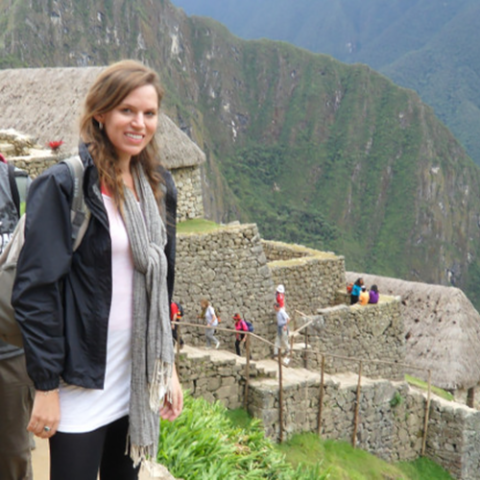Christine Sweeney
B.A. Alumna

Biography
International Republican Institute, Washington, DC
Christine Sweeney works for the International Republican Institute (IRI), a Washington, DC-based nonprofit, nonpartisan organization dedicated to advancing democracy worldwide. Christine began interning with IRI in the Asia Division in 2008 while still a student at Tulane and returned for each of her term breaks. After graduating in 2010, she was hired to work with the Latin America and the Caribbean division. As part of her job, Christine has worked on projects to bring e-voting to Peruvian elections, organized workshops for local elected leaders in Ecuador to understand the importance of democratic governance to more effectively serve their communities, and worked on a project to bring international domestic violence attorneys to Peru to assist Peruvian congresswomen to draft a law to combat domestic violence. Christine considers the most rewarding aspects of her job, in her words, ‘traveling to the field to connect with the local leaders, who are so energized to contribute to democratic stability in their countries which are often fraught with corruption and authoritarian executive leadership.  I once accompanied a Peruvian congressman on a series of town halls in some of the most impoverished areas of Lima‘“where many of the citizens had never interacted with their elected representatives.‘
Christine reflects on her time at Tulane…
Why did you choose to major in Latin American Stuides?
I chose LAST after taking a few introductory courses and becoming enchanted with the region and its rich but conflicted history. I began as a business major but was frustrated with the lack of academic theory and writing that came with it. I realized in my freshman year that it wasn’t for me. LAST at Tulane exposed me to a discipline through political, cultural, sociological, economic, and historic lenses. It challenged me to expand my perspectives of the world as an American and explore the experiences of a region so closely linked to and yet so different from North America.
How has your background in LAST helped you since graduation?
Through my studies and extracurricular opportunities at LAST and through cultivating relationships with my contacts in DC, I was fortunate enough to be hired into a position that utilizes both my undergraduate majors (Latin American Studies and International Development).  The LAST language requirement has served my day-to-day communication with partners in the field as I am required to speak and write in Spanish. I participated in an immersion study abroad program in Buenos Aires where I studied exclusively in Spanish and sat alongside locals in my classes. While abroad, I also had an internship at a local political watchdog group. Having to develop my opinions and conduct research for assignments in another language has greatly opened up my career options. Also, in exploring the history and culture of the Latin American region, I gained an invaluable understanding of the situations that shaped the democratic and political landscapes of the countries with which I now work.
Any words of wisdom for LAST undergraduates?
My advice to undergraduates is to study what interests you without worrying about hiring rates of graduates or what seems “practical” or “marketable.“ By choosing LAST over business, many rewarding professional opportunities opened up for me. I can honestly say that even in my first job, I feel good about the work I do and the impact it has. At Tulane, I studied with and learned from individuals who were deeply passionate about Latin America. I now work with people who are deeply passionate about understanding different parts of the world and contributing to more transparent, accountable and responsive democratic systems. I don’t know that I would have found this same passion in studying something solely for its “hire-ability.” Drawing on my own experience, I would also advise taking a year or two after graduating to work, volunteer, intern, travel, and explore before jumping into grad school. My professional experience has been invaluable in sparking academic interests and exploring different fields. When I am ready for grad school, I believe these experiences working internationally will greatly enrich my studies.
Christine is shown here meeting with Peruvian congressional members.

